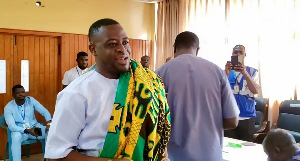Accra, Dec. 17, GNA - In an effort to end polarisation and acrimony that greeted transition in 2001, the Institute of Economic Affairs (IEA) and the Ghana Political Parties Programme (GPPP) on Wednesday launched the Presidential Transition Bill aimed at smoothening the country's transition process from one government to the other. The bill, which is the outcome of one-and-a-half years consultative process by the IEA and the National Chairmen and General Secretaries of the various political parties and representatives of the Civil Society Organisations, seeks to institutionalise a multi-partisan framework and ground rules and regulations to govern and guide transitions in future. Apart from 2001 in which the National Democratic Congress (NDC) government constitutionally transferred power to the New Patriotic Party Government, all other transitions since independence were through coups d'etat.
Speaking at the launch, Dr. Mensa Otabil, General Overseer, International Central Gospel Church, said the bill was historic for the country since there had never been a smooth transition until the Fourth Republic.
He said: "our transitions before the Fourth Republic had mostly taken the form of unconstitutional interruptions in the governance arrangements of the country. Thankfully, under this current republic, we have had three smooth transitions." Dr Otabil, who is also a member of IEA/GPPP, explained that the 2001 transition from the NDC government to the NPP was not the smoothest. He said research showed that the transition had been partly responsible for the extreme polarization of the Ghanaian society. Dr. Otabil expressed the hope that the bill would serve as a useful guide to future elected and outgoing presidents.
Representatives from the New Patriotic Party (NPP), National Democratic Congress (NDC), Convention People's Party (CPP) and the People's National Convention (PNC) gave their support to the presidential transition bill and urged the incoming parliament to enact it quickly into law.
Brigadier-General Francis Agyemfra, Senior Fellow, IEA, said many mistakes were committed during the transition in 2001 because there was no precedent to guide the two parties. He said a more harmonious transfer of power from one administration to another in a manner that did not introduce needles strain between the winner and the loser in an election helps in forging national reconciliation, lowering of political tension and promotion of inter-party cooperation. Brigadier-General Agyemfra said to avoid the repetition of the events and activities that had contributed to the polarisation of the society, there was a need for a framework that would spell out which political and public office holders lose their jobs on the assumption of office of a new president, guidelines for the treatment of appointees of the former government and end of service benefits, among others. 17 Dec. 08
General News of Wednesday, 17 December 2008
Source: GNA












